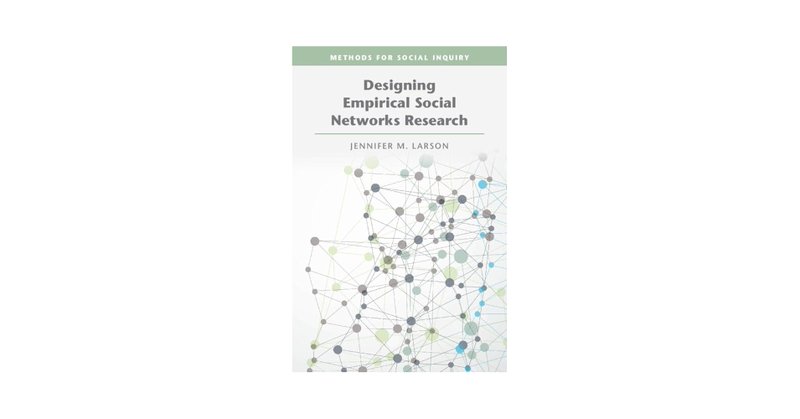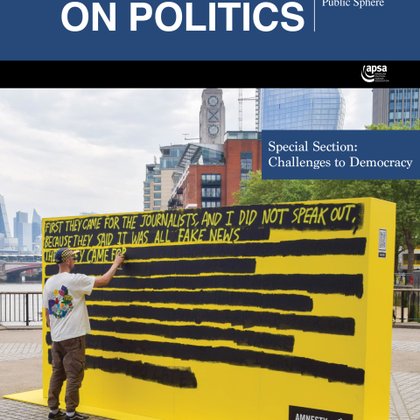
Alexandra Siegel
@aasiegel
Followers
2K
Following
4K
Media
40
Statuses
822
Associate Professor @CUBoulder Research Affiliate @CSMaP_NYU & @ImmigrationLab MENA Politics & Computational Social Science
Boulder, CO
Joined April 2009
⚽️ Super excited to see this out! ⚽️ The most fun I've had working on a paper thanks to @a_alrababah @wpmarble @salma_mousa_ @ImmigrationLab and of course @MoSalah! And thanks to @CUBoulder it's open access! 🥳
#OpenAccess from @apsrjournal - Can Exposure to Celebrities Reduce Prejudice? The Effect of Mohamed Salah on Islamophobic Behaviors and Attitudes - https://t.co/vAir7wq2y9 - @a_alrababah, @wpmarble, @salma_mousa_ & @aasiegel
#FirstView
5
14
118
Excited to share that I wrote a book to help researchers get up and running studying social networks: Designing Empirical Social Networks Research
amazon.com
A user-friendly introductory guide to the empirical study of social networks. Jennifer M. Larson presents the fundamentals of social networks in an intuition-forward way which guides theory-driven...
2
41
202
The advance copy of my book, Safe Havens for Hate, is here! It offers a deep dive into the moderation of harmful content on social media and explains why efforts to combat online extremism keep failing. Official release March 4! https://t.co/u4U5aCCwlX
7
30
130
Excited to share my new article in the American Journal of Political Science (@AJPS_Editor)! "Endogenous Opposition: Identity and Ideology in Kuwaiti Electoral Politics" explores how authoritarian elections generate opposition to incumbent autocrats. Link: https://t.co/zHR5o9ayE8
4
26
126
In war, civilians act to survive: flee, join, etc. Sometimes they also protest, help others, organize themselves. What’s the scope of such efforts? Where, when & why do they happen? In @PoPpublicsphere @aasiegel and I looked to Syria's war for answers 🧵 https://t.co/STwmP49jbI
cambridge.org
Civil Organizing in War: Evidence from Syrian Facebook Communities
1
35
98
#OpenAccess from @PoPpublicsphere - Civil Organizing in War: Evidence from Syrian Facebook Communities - https://t.co/ZgzFOrWEr9 - @rbkhoury & @aasiegel
#FirstView #Syria
0
3
15
Thrilled to share this analysis, and sneak peak of forthcoming research, with @aasiegel at such an incredible time for Syria. Activists, inside and outside the country, have been working for their cause and communities throughout a brutal war. 1/2
1
9
20
Poushali Mohanta used sentiment analysis and topic models to explore regional variation in Indian parliamentary debate texts surrounding the implementation of the Goods and Services Tax in 2017-2018.
0
0
0
Tania Massicotte used Congressional floor speech data, dictionary methods, and topic models to explore variation in anti-labor rhetoric from 1941 to 1951 surrounding the Taft-Hartley vote.
1
0
0
Jon Cohen used Latin American presidential speech data to explore the Rise in Anti-Indigenous speech and its relationship to political violence.
1
0
0
Elijah Boykoff explored variation in states' AI legislation using word embeddings and unsupervised ML.
1
0
0
Katie Sevin explored how state level actors and institutions worked to erode the intended goals of the Reconstruction Amendments using historical newspaper data.
1
0
0
Alexandra Philippidis explored variation in references to Palestine in global political manifestos using data from the comparative manifesto project.
1
0
0
Ansgarius Manek used Indonesian presidential speech data as well as data from public petitions, to explore whether elites lead or follow mass calls to action.
1
0
0
Stone Neilon used presidential campaign speeches and keyword assisted topic models to explore regional variation in candidates' messaging.
1
0
1
Monica Obregon used education bills and structural topic models to explore variation in legislation language in states with and without voucher programs.
1
0
0
Alex Newhouse collected large-scale 4chan data and finetuned a DistillBert model to explore how apocalyptic millenarian rhetoric responds to terror attacks.
1
0
0
Deepika Rama Subramanian used Reddit data and topic models to explore changes in the discussion of abortion after Roe v. Wade was overturned.
1
0
1
Isha Banerjee used supervised and unsupervised machine learning to explore when politicians incite anti-outgroup rhetoric in India
1
0
0
Katie Glenn used large-scale Twitter data, dictionaries, and word embeddings to explore gender differences in how constituents discuss politicians' appearance/fashion.
1
0
0
Eman Bensreiti used data from Gab, Truth Social, Telegram, and Bluesky, dictionaries, and topic models to explore how proponents of book bans evoke nostalgia rhetoric.
1
0
0







